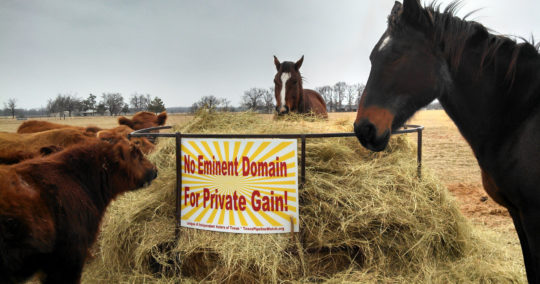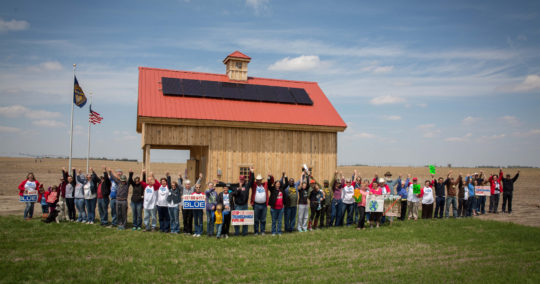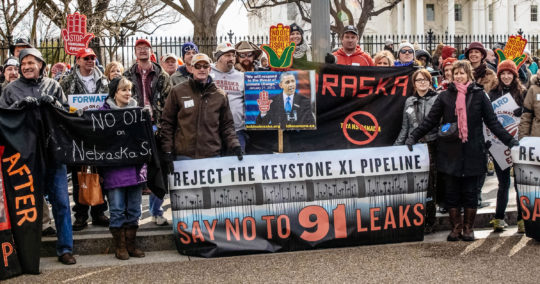

The Nebraska Legislature will hold a public hearing Tuesday, Dec. 15th at 1PM on two bills related to fracking wastewater and the Nebraska Oil & Gas Conservation Commission currently tasked with both regulating and promoting the oil industry in our state.
- WHAT: Legislature Hearing on Fracking, Oil & Gas Commission
- WHERE: Room 1525, Nebraska State Capitol
- WHEN: Tuesday, Dec. 15 at 1:00 P.M.
- ACTION: Submit written testimony on the form below
- RSVP on Facebook: Let us know you’re coming.
The bills from Sen. John Stinner (LR 154) and Sen. Ken Haar (LR 247) will look into the authority of the Nebraska Oil and Gas Conservation Commission and its role in decisions regarding the disposal of salt wastewater into dry wells, and examine the process of eliminating the Nebraska Oil and Gas Conservation Commission, respectively.
Stand with us and testify at the hearing, or else submit written testimony on the form below that we’ll deliver to Senators at the hearing.
TIPS FOR YOUR TESTIMONY:
The hearing is focused on study resolutions introduced by Senator Ken Haar (LR 247), that explores disbanding the Nebraska Oil & Gas Conservation Commission (NOGCC) and/or moving its authority to other state agencies; and Sen. John Stinner (LR 154), on the role of the Oil and Gas Commission related to disposal of wastewater into injection wells.
- A recent poll found that 77% of Nebraskans are opposed to fracking waste, and 88% believe we should have the proper laws in place.
- Transparency + “public” hearings: The Legislature ignored pleas from Bold Nebraska and Nebraska Sierra Club to hold a hearing in Scottsbluff, in order to give the landowners and others most impacted by the proposed fracking waste disposal well an opportunity to testify. Instead they scheduled on it on a Tuesday morning at 9:00 a.m. in the town of Sidney — a 90-minute drive for landowners affected by fracking waste, and 5+ hours for those in Lincoln or Omaha. The issue of transparency and accessibility for public hearings on fracking is one that should be raised during the hearing. This continues the effort by Government agencies to stifle the voices of the public, the same way the NOGCC first told us we couldn’t testify during their fracking well hearing process — and then completelyignored all public testimony when voting on their decision.
- On deaf ears: Oil & Gas Commission fails to respond: State Senators, public health officials, landowners, environmental groups, citizen advocacy groups and the Oglala Sioux Nation were all united in their clear statements on fracking waste. Every single one of these groups of people all asked for the Oil & Gas Commission to reject the permit — or at the very least, put it on hold until proper scientific studies can be completed and proper laws put in place. The NOGCC ignored these voices and approved it anyway.
- Conflict of interest: Oil & Gas Commission “promotes” AND “regulates”?: The Oil and Gas Commission — an unelected body appointed by Gov. Ricketts — has a mission to both “promote” and “regulate” oil and gas (including fracking waste). You simply cannot regulate on the one hand, and promote on the other without having a clear conflict of interest.
- Better options: The Legislature will be considering whether “the statutory and regulatory duties currently under the jurisdiction of the Oil & Gas Commission could be better conducted by the Department of Environmental Quality, the Department of Natural Resources, the Public Service Commission, natural resource districts, counties, or other appropriate agencies or political subdivisions;”
- How do Nebraska’s fracking laws stack up?
- Nebraska has no laws in place to protect our land, water and public health from fracking waste.
- Colorado’s regulations on oil and gas run 300-400 pages, while Nebraska has just 50 pages, with only a few sentences about protecting our land and water.Colorado requires a $1 million bond to cover accidents, while Nebraska requires only $10,000 — less than the insurance on your car.
- In Kansas, new maximum daily limits were placed on disposal of fracking wastewater because of concerns it was causing earthquakes on previously unknown fault lines.
Loading…



